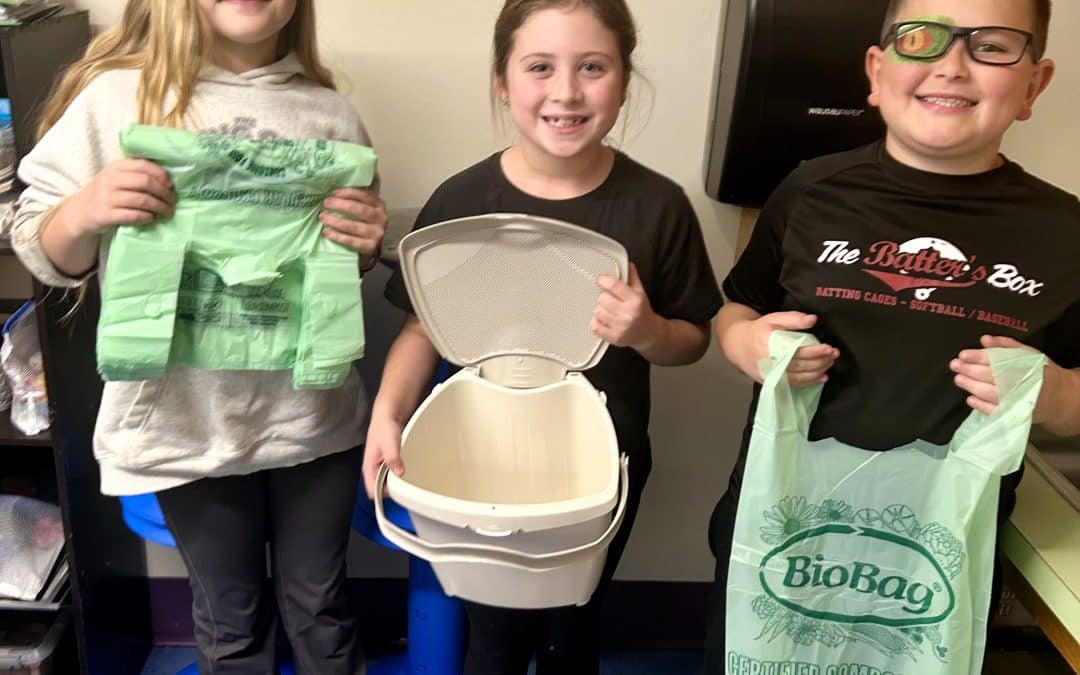Chester grade 4 students Abigail Ripley, Cassidy Toporowski and Blake Sakaske hold up classroom compost buckets and biodegradable bags for their composting project.
Reminder Publishing submitted photo
CHESTER — Vanna Maffuccio, principal of Chester Elementary School, welcomed Mary Stucklen, owner of Tommy’s Compost Service in the Berkshires, to spend the day Oct. 28 with staff and students to assist them in expanding the school’s composting efforts beyond the lunchroom. The visit was funded by the BARR grant.
“We started composting lunch scraps last school year. This school year we aim to improve our outdoor composting bin’s design and expand our composting efforts to include the composting of breakfast scraps,” said Maffuccio. At Chester, students eat breakfast in their classrooms.
Stucklen, who named her company after her young son, Tommy, arrived at the school dressed as a banana, ready to enthusiastically teach six different classrooms of learners about composting. She taught kindergarten through fifth grade students why and how people compost through an engaging and interactive lesson, Maffuccio said.
Following each lesson, Stucklen provided each classroom with its own individual composting bin for breakfast scraps. She also provided the school with a generous supply of bio bags that will be used to line classroom composting bins. Bio bags are 100% certified compostable shopping bags.
Stucklen then joined the school outside to provide feedback related to improving and rethinking the school’s current open compost container, used last school year to compost lunch scraps from the cafeteria. After the discussion, the school decided to purchase a large composting box and an aerator. The box can hold up to 120 gallons of transferred compost or yard compost. According to the instructions, organic waste will decompose in 4-6 weeks and yield vitamin-enriched soil that can be used to fertilize vegetables and flowers. The aerator is a tool used to stir the compost in the bin to aerate it. The total cost of both items is approximately $110.
Maffuccio said Tommy’s Compost Service will support the school in improving or redesigning its current outdoor composting bin, and by providing wood chips to act as a filter to soak up the moisture from the food scraps and eliminate odor. The recipe for compost is three parts “brown matter,” like wood chips, to one part food waste.
The visit ended with the unloading of a truckload of wood chips from Tommy’s Compost Service into the school’s current composting bin.
After the visit, Maffuccio and her team emailed all of the classrooms in the school, thanking them for welcoming “Mary the Banana of Tommy’s Compost” into their classrooms.
She said each classroom should be set to start composting with a bin and a set of green compostable bags, which they were warned must not be left in direct sunlight, as they will melt. Classroom compost bins will be emptied on Tuesdays and Fridays by fourth and fifth grade students, known as the “Compost Crew.” Students will take turns being part of the “Compost Crew” in pairs, alphabetically, and dates have been mapped out through the end of January 2025.
Maffuccio attached a composting poster that will be printed for each classroom, to be taped above their compost bin as a quick visual reminder for students about what can/cannot go into the bin.
“Happy composting! Go bananas!” she told them.


